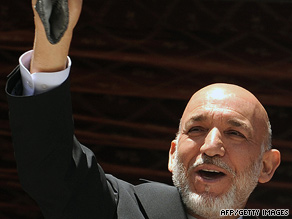
In less than three weeks, Afghan voters — still reeling from one of the most violent months since the war on terror started — head to the polls for what some call the country’s first-ever truly contested election.
Two candidates, former Foreign Minister Abdullah Abdullah and former Finance Minister Ashraf Ghani, have emerged as the top contenders among the dozens hoping to unseat President Hamid Karzai, who has led the country since shortly after the 2001 fall of the Taliban and is seeking re-election. Abdullah and Ghani spoke to CNN’s “Fareed Zakaria GPS” on Sunday, expressing disappointment with the current administration in Kabul and what they hope to accomplish if they win the August 20 election. Karzai “turned out to be a very poor manager, in the sense that he could not deal with issues in a manner that would respond to the needs and aspirations of the people and create a sense of momentum,” Ghani said. “The other side was his tolerance for corruption that grew into a massive disease, into a cancer that’s eating through the society.” He noted that Afghanistan’s government has been ranked by the Brookings Institute as the fifth most corrupt; the center of drug production; and “a place of disenchantment of the population with this government.” He blamed what he called Karzai’s “bad governance” for the return of the Taliban force — not a military or ideological resurgence. “I have talked to a lot of people in the south, where the heart of the insurgency is. And time and again, their story comes to one thing: an injustice that could no longer be tolerated and forced them to active resistance,” Ghani said. Earlier this year, Karzai said in an interview that if he wins another five-year term, he will put a special emphasis on building dams and bringing electricity to the Afghan people. A U.S. government assessment determined that less than 10 percent of Afghans have access to electric power.
Don’t Miss
At least 9 NATO troops killed
Al Qaeda’s training adapts to drone attacks
European gang trained for terror
Karzai emphasized also the importance in the coming years of what he described as the “peace process” with the Taliban. He characterized it as being at “the heart” of what his government hopes to achieve, and said he is “glad that the Obama administration is backing this.” Fifty-nine percent of this year’s civilian casualties resulted from insurgent bombs. The U.N. report concluded that Taliban insurgents — which have regrouped and gained momentum since 2004 — are “basing themselves in civilian areas so as to deliberately blur the distinction between combatants and civilians, and as part of what appears to be an active policy aimed at drawing a military response to areas where there is a high likelihood that civilians will be killed.” “Because of the resentment of the people, dissatisfaction of the people towards the government, the current administration is losing the people, and it is strengthening the insurgency,” presidential contender Abdullah told CNN Sunday. “That trend has to reverse before anything else could happen.” “There is no doubt there is a hardcore element in it,” he added. “But there are thousands of people under the same brand, Taliban, which have joined the insurgency because of other reasons.” Abdullah, a former foreign minister of Afghanistan, was a key figure in the Northern Alliance, the opposition group that helped the United States topple the Taliban after the September 11, 2001, attacks. He called Karzai’s previous relationship with the Bush administration a “blind date,” saying both sides ultimately realized the partnership was not sincere. “I think in the United States is a new beginning and a new approach towards many issues, including Afghanistan,” Abdullah said, referring to the Obama administration. “In Afghanistan there is a hope that, as a result of the elections, there will be another opportunity for working together in order to help Afghanistan stabilize … ” The United States and Britain recently said they are committed to remaining in Afghanistan, despite increased military casualties and declining public support for the war effort. Watch the growing backlash in Britain to the Afghanistan mission » Last week, Richard Holbrooke, the U.S. special representative for Afghanistan and Pakistan, told reporters that boosting the training of Afghan forces would be a big focus after the country’s August 20 election. When asked whether the election would be fair, Holbrooke, who just returned from the region, said he had heard complaints from all sides but was not “unduly upset.”
Ghani told CNN that “an exit date” for international forces should be a long-term goal for his country. But the first issue at hand is establishing a cease-fire with insurgents. “First we need to get a cease-fire — this is not going to be an easy issue,” he said. “But we need to try everything possible, so we can build a cease-fire. … International forces in Afghanistan, in general, and those of the United States, in particular, are not here to colonize Afghanistan or to build an empire. They are here to create a stable Afghanistan that would be a source of stability to the region and the world at large.”